Greetings RE-AMPers!
- We had a great Annual Meeting in Chicago recently! Thanks for all who participated, planned and supported it! Read the Annual Meeting recap in this month’s newsletter.
- If you have an idea for an Action Team, applications are open for Level 1 Action Teams now. The next deadline to apply to form a Level 2 Action Team is August 31.
- Featured during this year’s Annual Meeting, the Organizing Hub’s Peer Learning Circle had some surprising results from their testing you don’t want to miss.
- Melissa Gavin hired as the RE-AMP CNO!
- See the Steering Committee election results.
- Check out the Mentorship Toolkit.
- See what Network Events are happening.
- Don’t forget about past events in the From the Archives section!
— Feature Stories —
Action Team Applications Now Open
Applications are now open for regional Action Teams. We’ve learned a lot through our shared analysis on how to reach our North Star goal, including a lot more about what we need to figure out in order to get there. A regional collaboration fund is available to fund Action Teams, which are diverse groups of people who come together to figure out complex problems related to our shared analysis. We anticipate Action Teams receiving anywhere from $5000-$15,000 depending on the scope of their work. Note that funding is available only for Level Two Action Teams, but other forms of support are available for Level One Action Teams. The full list of criteria and more information can be found on the Commons under the Activity tab.
If you are interested in exploring a topic, we suggest checking out the list of topics from the Annual Meeting and/or connect to the appropriate Commons group. For example, the conversation around rural electric cooperatives is going to use the Rural Caucus group as they get up and running. If you have a topic related to clean energy, you should use the Clean Energy Working Group to initiate the conversation, etc. If you do already have an Action Team formed, send a message across the Commons and invite other Network members to the conversation!
Once an Action Team has been approved, RE-AMP staff will create a space for you on the Commons. You can use another platform of your choosing as well (for example google groups). Just please add info@reamp.org to your list!
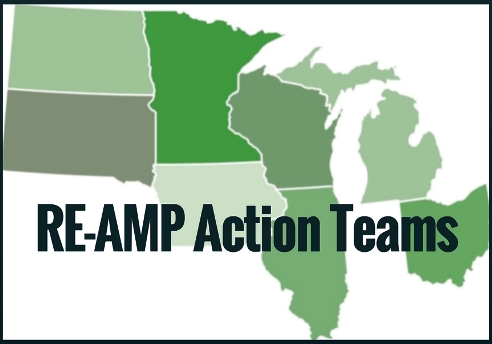
— Network News —
The Annual Meeting: Empowering the Midwest Climate Movement
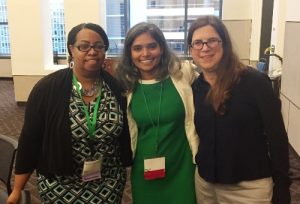 The RE-AMP Network is designed to empower the advocates and funders in the Midwest to be effective changemakers by being a systems-based generative social impact network. It’s worked! While our structure and operations have adapted over time, our approach to Thinking Systemically and Acting Collaboratively has helped us achieve numerous beneficial policies across the Midwest, including a huge energy package in Illinois this past legislative cycle. And the only way we are going to continue to address the climate crisis is to continue to get better at Acting Collaboratively and Thinking Systemically. That’s what we did at the 2017 Annual Meeting.
The RE-AMP Network is designed to empower the advocates and funders in the Midwest to be effective changemakers by being a systems-based generative social impact network. It’s worked! While our structure and operations have adapted over time, our approach to Thinking Systemically and Acting Collaboratively has helped us achieve numerous beneficial policies across the Midwest, including a huge energy package in Illinois this past legislative cycle. And the only way we are going to continue to address the climate crisis is to continue to get better at Acting Collaboratively and Thinking Systemically. That’s what we did at the 2017 Annual Meeting.
Advocates and funders from over 80 member organizations spent three days in Chicago getting a greater understanding of Equitable Deep Decarbonization and using that information to seed conversations for the open space conversations. Fifteen topics were proposed for open space topics at this year’s meeting. If you are interested in any topic, contact the lead listed.
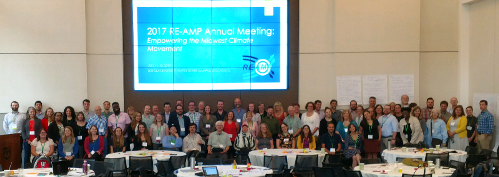
What else did we accomplish at the Annual Meeting?
- Connections and relationships were made like these:
- Karlee Weinmann, Institute for Local Self Reliance was connected to Jackson Koppel, Souladarity via Kathryn Savoie, Michigan State Table Coordinator around community solar.
- Liz Veazey, We Own it met Liz Loos, Dakota Resource Council and now the Liz’s are working together to share their expertise through rural electric coop fellowship program.
- Work moved forward:
- Regional Action Teams:
- We’ve already had our first action team application on Faith In Solar work and given the robust conversations at the Annual Meeting we’re expecting more Regional Action Team Proposals to come in. If you need more information or are interested in applying check out the Action Team Page on the Commons found under the Activity Tab.
- Conversations around rural electric coops was a hot topic during the open space and members of this group want to convene. If you’d like to join the conversation contact Liz Veazey at liz@weown.it
- There were over 15 topics identified as ripe for open space at the Annual Meeting. You can find the list and person who facilitated the conversation here.
- Regional Action Teams:
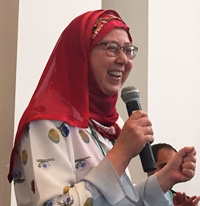 Our Shared Analysis:
Our Shared Analysis:
- Jessica Collingsworth, Ash Narayanan, Huda Alkaff, and Gail Francis facilitated a plenary conversation about our Networks evolving Equitable Deep Decarbonization Framework. Here are some of the important ideas that emerged, Bridging equity and technology: As we continue to recognize the historic, present, and projected disparities in the costs and benefits of how energy is generated and consumed, we still need to improve in our ability to consistently address these disparities in the benchmarks we set for ourselves as a network. Many members commented that they appreciated the steps taken in this regard at the Annual Meeting, and that they are eager to see our carbon-reduction strategies more closely align with our values of fairness. There is already exciting work happening. Jenn Hill pointed to an exciting collaboration with unions, environmentalists and the Rockefeller Brothers as an example of how diverse groups are equitably working to reduce carbon pollution. Who else do our members admire, and what can we learn from them, and what might we contribute to other efforts? Drop Gail a line with thoughts!
- In interviews with members following the plenary, a common theme that came up in exploring equity was the importance of listening to each other.
- The plenary sparked active conversations about the challenges of equitably creating a 100% renewable scenario, as well as ideas for alternate framings of the concepts of equitable deep decarbonization for external messaging.
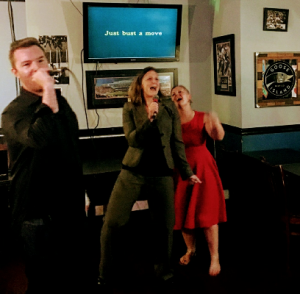 Fun was had
Fun was had
- Jack Schlachter knows how to rap Bust A Move and do it well! Maybe we need a karaoke night at a future Annual Meeting?!
- Things were heating up in the straw poll between North Dakota and Wisconsin. We gave the floor to advocates to make their very passionate pitches.
- Little Village Environmental Justice Organization hosted a Toxic Tour where Network members got to visit the communities that are disproportionately affected by climate change and energy policies.
- We learned how to improve the Annual Meeting for next year
- We’ve been compiling and reading through the evaluations. THANK YOU for your feedback!
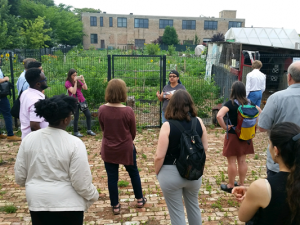 Speaking of next year’s Annual Meeting, Network members at this year’s meeting voted in favor of hosting the 2018 Annual Meeting in North Dakota. The Annual Meeting Planning Committee will explore the feasibility of hosting a Legendary RE-AMP Annual Meeting in North Dakota in 2018, so stay tuned!
Speaking of next year’s Annual Meeting, Network members at this year’s meeting voted in favor of hosting the 2018 Annual Meeting in North Dakota. The Annual Meeting Planning Committee will explore the feasibility of hosting a Legendary RE-AMP Annual Meeting in North Dakota in 2018, so stay tuned!
RE-AMP 2017 Annual Meeting notes and presentations
Photos can be found on our shared Flickr Account. Name: reamp2050 | Password: Network2050
Melissa Gavin Hired as Chief Network Officer
 We are delighted to announce that the robust search for RE-AMP’s next Chief Network Officer has concluded and that Melissa Gavin has accepted the RE-AMP Steering Committee’s offer to fill the position in a permanent capacity. As you know Melissa has been “Interim” leader of RE-AMP since September 2016 and has ably led the Network through restructuring, updating RE-AMP’s systems analysis, a refresh of our governance structure and the election of the next steering committee, the design and roll out of Action Teams, and so much more. Melissa has worked closely with RE-AMP’s Steering Committee as thought leaders and helped moved the SC to decisions that impact our collective work. While the CNO search process was competitive, Melissa’s star shone brightest and we are thrilled that she has agreed to lead RE-AMP as the members continue to think systemically and act collaboratively.
We are delighted to announce that the robust search for RE-AMP’s next Chief Network Officer has concluded and that Melissa Gavin has accepted the RE-AMP Steering Committee’s offer to fill the position in a permanent capacity. As you know Melissa has been “Interim” leader of RE-AMP since September 2016 and has ably led the Network through restructuring, updating RE-AMP’s systems analysis, a refresh of our governance structure and the election of the next steering committee, the design and roll out of Action Teams, and so much more. Melissa has worked closely with RE-AMP’s Steering Committee as thought leaders and helped moved the SC to decisions that impact our collective work. While the CNO search process was competitive, Melissa’s star shone brightest and we are thrilled that she has agreed to lead RE-AMP as the members continue to think systemically and act collaboratively.
Please extend your congratulations to Melissa.
We also want to thank the tremendous CNO Search Committee who worked tirelessly and with great commitment to RE-AMP’s success: Brian Depew, Center for Rural Affairs; Susan Olsen & Lori Koppelman, The Minneapolis Foundation; Michael Noble, Fresh Energy; Nicole Rom, Climate Generation; Emily Van Dunk, Argosy Foundation; and, Aimee Witteman, McKnight Foundation.
Congratulations Melissa – we are so looking forward to working with you!
On behalf of the RE-AMP Steering Committee, RE-AMP SC Executive Committee,
- Jennie Curtis, Garfield Foundation
- Brian Depew, Center for Rural Affairs
- Nachy Kanfer, Sierra Club
- Nicole Rom, Climate Generation
2017 Steering Committee Results
Ballots for the Steering Committee closed during the Annual Meeting and we formally welcomed our new Steering Committee on the final day of the meeting!
For the first time ever, we had a write in campaign, for Denise Abdul-Rahman, NAACP Indiana and she will be joining fellow winning candidates:
|
Jessica Tritsch
Sierra Club
|
Jessica Collingsworth Iowa Interfaith Power & Light  |
| Susan Hendershot Guy Iowa Interfaith Power & Light  |
Emily Van Dunk Argosy Foundation  |
| Peter Skopec WISPIRG  |
Liz Veazey We Own It  |
| Sean Estelle PowerShift Network  |
Sonda Sauers Dakota Resource Council  |
| Charles Griffith Ecology Center  |
Denise Abdul-Rahman NAACP Indiana  |
At the Annual Meeting, we recognized and thanked our outgoing Steering Committee members for their tremendous leadership and contribution to the Network. If you get a chance, take some time to thank them for their service:
|
Antonio Lopez
LVEJO
 |
Brian Depew Center for Rural Affairs  |
| Jennie Curtis Garfield Foundation  |
Ed Miller Joyce Foundation  |
| Lola Schoenrich Great Plains Institute  |
Cassie Steiner Sierra Club John Muir Chapter  |
| Nachy Kanfer Sierra Club  |
Ryan Werder Energy Foundation  |
| Satya Rhodes Conway Center for Wisconsin Strategy  |
Nicole Rom Climate Generation  |
| Duane Ninneman Clean Up Our River Environment  |
— Campaign & State Table Updates —
Surprising Results From the Peer Learning Circle
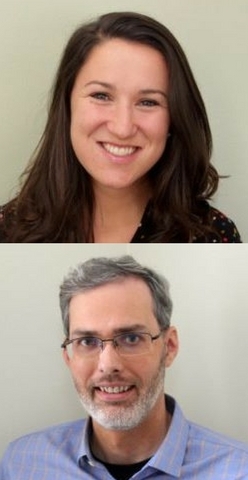 If you were at the Annual Meeting you got to hear directly from the participants in the Peer Learning Circle during the Let’s Test It Session but for those of you who weren’t here’s a recap of they discovered.
If you were at the Annual Meeting you got to hear directly from the participants in the Peer Learning Circle during the Let’s Test It Session but for those of you who weren’t here’s a recap of they discovered.
In July, participants wrapped up a 6-month Peer Learning Circle, where 4 organizations worked in a cohort with social scientists and data experts from the Climate Advocacy Lab to explore evidence-based advocacy. Each group designed their own experiment to test how they could improve public engagement around climate change.
Illinois Environmental Council used Facebook ads to ask if referencing the federal administration would make people more likely to take an action supporting energy and environmental issues at the state level, and discovered that with the federal language the cost-per-action was more efficient, however the ads without the federal language led to more likes, shares, comments and reactions.
Iowa Interfaith Power & Light did an A/B test of email action alerts to ask, “How does an economic justice message that focuses on rural poverty in Iowa resonate within the faith community as compared to an economic development message, especially when working to motivate individuals to take action on Iowa’s state solar tax credits?” The results were that the rural economic justice message was not as appealing as the economic development message. Going forward, Iowa IPL will do a similar test on Facebook, test this message against other message frameworks, implement the results in campaign work, and create more of a culture within their organization for testing.
Wisconsin Green Muslims asked, “How can the unifying power of solar energy help overcome Islamophobia in Wisconsin,” with a three-question Google Survey and compared the results of using an image on the survey with a Muslim frame to a Christian frame. When asked, “how interested are you in learning more about the Faith in Solar Initiative in WI,” the Christian frame received greater interest. When asked the two other questions, “do you support or oppose increasing the amount of electricity WI generates from solar power,” and “to what extent do you agree Faith and Solar is an organization that shares your values,” there were no statistically significant differences in the answers with the two frames. Wisconsin Green Muslims also used a different survey with people in-person, and discovered that stories of faith communities installing solar on their places of worship do more to advance the outreach of WFSI than stories of people of faith installing solar on their own homes — next they’ll continue these surveys in select communities in Wisconsin.
We Own It planned a proof-of-concept to test the ability to target members of a single electric co-op with high precision with an online ad via Facebook, by cutting a voter file by the GIS shapefile of a single co-op territory, and importing the resulting list into Facebook custom audiences. Overall, they expected to get 70,000 records from the VAN, and ended up with 182,000, and expected a 50% match rate in Facebook and got a 90% match rate. Next, We Own It will continue testing, looking at new states, different mediums (images vs videos) and messages, and other factors.
A huge thanks goes to Carina Barnett-Loro, Justin Rolfe-Redding, and the other experts with the Climate Advocacy Lab for their expertise and guidance.
Mentorship Toolkit
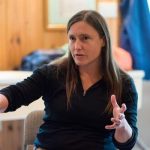 by Abby Fenton, Climate Generation
by Abby Fenton, Climate Generation
This toolkit draws on the Emerging Leaders Mentorship Program which Climate Generation ran for four years with support from RE-AMP. The Toolkit is combination of activities adapted from Eugene Kim’s muscle’s and Mindsets exercises, as well as original activities from Climate Generation – and is aimed as supporting self-facilitated learning relationships based in mutuality.You can find the toolkit here.
— Network Events —
State Table Renewals Due | August 1
State Table Interim Reports Due | August 1
RE-AMP Steering Committee Meeting | August 3
Minnesota State Table Meeting | August 22
State Table Leaders Cohort Call | August 24
Level 2 Action Team Applications Due | August 31
RE-AMP Steering Committee Meeting | September 26-28
Minnesota State Table Meeting | September 26
Media and Communications Training for Michigan State Table | Detroit | September 28
— From the Archives —
Faith in Solar | June 2017 | Recording here | PowerPoint Slides available here.
Iowa Interfaith Power & Light is putting their faith in solar! By installing and supporting solar on congregational facilities, people of faith are reducing their carbon emissions and relying on safe, clean, and renewable energy, all while saving money on their energy bills—money they can invest in their community and in their mission.
Iowa Interfaith Power & Light is partnering with members of the Iowa Solar Energy Trade Association (ISETA) to offer this informative webinar for congregations and faith communities interested in installing solar on their facilities. In this free, one-hour webinar, three presenters will walk participants through the process of installing solar from start to finish. Participants will receive a brief introduction to solar energy, a better understanding of the application and installation process, and will learn about different models for financing solar as a non-profit organization.
Analysis and Action: A Discussion of Action Teams in an Equitable Deep Decarbonization Framework | May 2017 | Recording here | PowerPoint Slides available here.
In this webinar, Interim Network CEO introduces Action Teams and opens applications. Ryan Jones from Evolved Energy Research shares insights about regional implications, including cost, of a high renewables pathway to decarbonization, and Network Knowledge Manager Gail Francis shares an evolving Equitable Deep Decarbonization framework.


